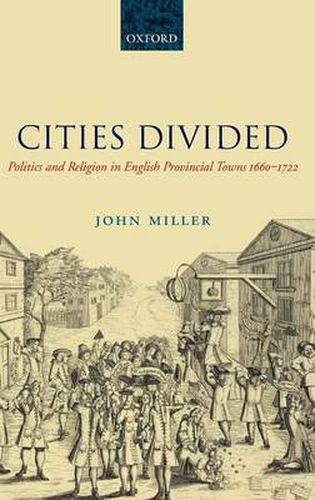Readings Newsletter
Become a Readings Member to make your shopping experience even easier.
Sign in or sign up for free!
You’re not far away from qualifying for FREE standard shipping within Australia
You’ve qualified for FREE standard shipping within Australia
The cart is loading…






The religious and political history of late seventeenth- and early eighteenth-century England is typically written in terms of conflict and division. This was the period when party conflict - exacerbated by religious enmities - became a normal part of English life. Rather than denying the importance of partisan divisions, this book reveals how civic celebration, designed as an expression of unity and amity, was often used for partisan purposes, reaching a peak in the 1710s. The animosities were most marked in elections, which were often corrupt and drunken, and sometimes very violent. But division and conflict were not universal. Many towns avoided electoral contests, not because they were in the pocket of a great aristocrat, but as a matter of deliberate policy. Despite occasional disorder, urban government rarely broke down, and even violent elections ended with bruises rather than fatalities. Professor Miller suggests an explanation for this in the nature of urban governance. While the formal structures of town government were profoundly undemocratic - vacancies on corporations were most often filled by co-option - there was much participation, consultation, and negotiation in the lower levels of government. In addition, corporation members lived in close proximity to, and did business with, their fellow townspeople, and needed to meet their expectations. These expectations might have been modest - they wanted streets to be reasonably clean and kept in adequate repair, sewage and rubbish to be removed, law and order maintained, and the deserving poor relieved. But they were the things that made daily life tolerable, and for many they mattered more than politics.
$9.00 standard shipping within Australia
FREE standard shipping within Australia for orders over $100.00
Express & International shipping calculated at checkout
The religious and political history of late seventeenth- and early eighteenth-century England is typically written in terms of conflict and division. This was the period when party conflict - exacerbated by religious enmities - became a normal part of English life. Rather than denying the importance of partisan divisions, this book reveals how civic celebration, designed as an expression of unity and amity, was often used for partisan purposes, reaching a peak in the 1710s. The animosities were most marked in elections, which were often corrupt and drunken, and sometimes very violent. But division and conflict were not universal. Many towns avoided electoral contests, not because they were in the pocket of a great aristocrat, but as a matter of deliberate policy. Despite occasional disorder, urban government rarely broke down, and even violent elections ended with bruises rather than fatalities. Professor Miller suggests an explanation for this in the nature of urban governance. While the formal structures of town government were profoundly undemocratic - vacancies on corporations were most often filled by co-option - there was much participation, consultation, and negotiation in the lower levels of government. In addition, corporation members lived in close proximity to, and did business with, their fellow townspeople, and needed to meet their expectations. These expectations might have been modest - they wanted streets to be reasonably clean and kept in adequate repair, sewage and rubbish to be removed, law and order maintained, and the deserving poor relieved. But they were the things that made daily life tolerable, and for many they mattered more than politics.